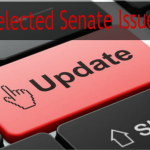August 19, 2013
The purpose of the President’s Special Task Force is to review and assess administrative and academic programs at the University. A “program” is defined as any unit that uses resources (e.g., people, dollars, equipment) and provides “a produce or service that has a specific target audience and has a particular set of closely-related goals, outputs, and outcomes associated with it” (see http://www.brocku.ca/program-review/wp-content/uploads/2013/08/informationsession20130816.pdf). Members in roles such as Chair or Director will be asked to identify and then submit a report on each academic program (e.g., each degree program within a Department or Centre), as well as department/centre administrative offices. On the basis of these reports, Task Force members plan to sort these programs into a series of hierarchical categories (e.g., top 20%, next 20%). At the top of this hierarchy will be programs that the Task Force judges to be worthy of enriched funding; at the bottom the Task Force will place those programs that it has identified as candidates for reduction in funding, phasing out, or consolidation.
BUFA has expressed a number of serious initial concerns about this program review and prioritization process, which were articulated in my email to members of July 16, 2013 https://bufa.ca/blog/?p=141. As a result of sharing this email with President Lightstone, BUFA was invited to meet with the Co-Chairs of the Task Force, Provost and Academic VP Murray Knuttila and Finance and Administration VP Brian Hutchings. On August 13, BUFA VP Hilary Findlay, BUFA Communications Officer Larry Savage, and myself met with the Co-Chairs to express BUFA’s initial concerns in more detail. BUFA appreciated this opportunity for discussion with the Administration, as well the Co-Chairs’ willingness to bring our concerns to the Task Force members for their consideration at its meeting later that day. In the paragraphs below, I describe the major issues we raised with the Co-Chairs, our requests to the Task Force, and the Task Force’s response.
Task Force Composition. Many BUFA members have expressed concern that the Task Force, whose members were appointed directly by the President, does not have representation from Business, Library, and Social Sciences. Provost and VP Knuttila reported that he had raised this issue with the Task Force early in the process but there had been a consensus of Task Force members not to expand its membership to include representatives from these units. From another source, however, we have been told that it was also President Lightstone who insisted that the membership of the Task Force not be increased. We further noted that the Task Force has only three faculty members who do not have administrative reporting responsibilities, while senior administrators are very well represented. BUFA asked that the Task Force reconsider its decision not to include representation from all academic faculties and the library. Provost and VP Knuttila reported to BUFA that the Task Force again has decided not to increase the breadth of academic representation, although there was a vague reference to possible future attempts to involve more members of the University community at some points in the review process. As a point of contrast, we note that when faculty at Wilfrid Laurier University objected to the “top down” process of Presidential appointments to its program review committee, the University responded by expanding the committee to include elected members.
At our August 13th meeting, BUFA raised the issue of the Task Force’s infringement on the Senate’s legislated mandate to review academic programs in general and, specifically, the responsibility of its Academic Review Committee (ARC), which is responsible for academic “quality control” at Brock. Provost and VP Knutilla acknowledged that the Task Force does replicate some of the work of ARC but the Task Force also will be reviewing non-academic programs and including them in its recommended ranking. We note that the program review process at the University of Saskatchewan involves separate review committees for academic and administrative programs. Thus, it avoids the mind-boggling task of trying to place radically different types of programs along a single evaluative continuum of categories (e.g., comparing the Philosophy Department to the Swimming Pool, or grouping the Music Library and Parking Services in the same category of ranking).
Openness and Transparency of the Process. President Lightstone clearly stated that the program review process would be open and transparent (see President’s Briefing Note, May 31, 2013). BUFA acknowledges the University’s steps toward openness in establishing a website for the Program Review that contains releases from the Task Force and the President. However, we judge that these steps fall short of what is needed to meet the promised openness and transparency goals. For example, the Task Force has been meeting since the first week of July and, as of August 18, has not published its minutes. In this context, BUFA asked that the minutes of the Task Force be posted on its website and accessible to the Brock Community. Provost and VP Knuttila reported to BUFA that the minutes now will be posted on the program review website, once they have been approved by the Task Force. BUFA also asked that the meetings of the Task Force be open to members of the Brock Community. The Task Force members denied this request, claiming that they need secrecy in order to have open and honest debate. BUFA disputes this (somewhat ironic) position. Senate meetings are open, as are Senate Committee meetings, and we believe this is the appropriate model for a process that is supposed to be transparent and accountable. We do not understand why the process of evaluation and ranking of programs according to publically accessible criteria should be hidden, if it is done fairly and objectively.
Broad Consultation in Developing the Criteria for Program Assessment. The selection of specific criteria is a critical decision that will drive the entire review process. BUFA has argued for a “bottom up” process for identifying program criteria that originates in the expertise and experience of faculty and students. In this context, BUFA strongly recommended that the Task Force engage in a broad and meaningful consultation with the Brock community in the development of the criteria it will use to review programs. Indeed, the Task Force should welcome and encourage the insight, knowledge, and participation of as many individuals as possible throughout all phases of its work, but particularly in this core aspect of the Task Force’s mandate. This was not to be, however. Instead, in a “top down” process, the Task Force has already identified the assessment criteria. The Task Force has just posted this criteria on its website and is allowing individuals to send in electronic feedback. The richness, creativity, and collaboration that might have occurred in an interactive exchange between the Task Force and the Brock community in developing the criteria have been lost. Time pressure was a primary reason given to BUFA for this “here is what we want as criteria and now send us an email with your opinion” type of consultation. As it turns out, and in contrast to the Administration’s stated position that Robert Dickeson’s program review process would be adapted to the Brock context, the Task Force has simply adopted his set of criteria (see http://www.brocku.ca/program-review/wp-content/uploads/2013/08/criteria-draft.pdf) presented in Dickeson’s (2010) book, Prioritizing Academic Programs and Services: Reallocating Resources to Achieve Strategic Balance. This lack of meaningful and open dialogue around the criteria is one example of how the astoundingly short time frame that the University has imposed on the program review process is likely to compromise its validity, credibility and value.
In summary, then, BUFA has raised a number of concerns with the Program Review process, including the composition of the Task Force, infringement on Senate responsibility, problems inherent in the joint consideration of academic and non-academic units, a lack of openness, and inadequate consultation. BUFA is also in the process of asking for more detailed financial information from the University in order to make its own assessment of the financial crisis that the Administration has described as necessitating the program review itself. The University has indicated its willingness to share this information and we will update you as our financial analysis proceeds.
In making the above requests to the Task Force, BUFA is trying to improve what it considers to be a flawed program review process. Most, but not all, of our suggestions were rejected. We will continue to monitor the program review and prioritization, express our concerns, make suggestions, and keep you informed. We welcome your comments and encourage you to express your thoughts to the Task Force and President directly, as well as to BUFA. We anticipate that the program review will be a topic of considerable discussion by the 2013-2014 Senate and therefore also encourage you to talk with Senators and Senate Committee members about this process.
Linda Rose-Krasnor
BUFA President



